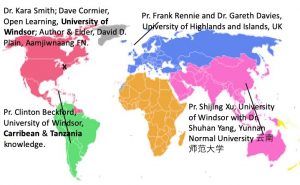Introduction
Global EdD in Remote Pedagogy and Stewardship
(4 Self-Taught Modules and 1 Registered Dissertation)
The University of Windsor sits on the traditional territory of the Three Fires Confederacy of First Nations, which includes the Ojibwa, the Odawa, and the Potawatomi. We respect the longstanding relationships with First Nations people in this place in the 100-mile Windsor-Essex peninsula and the straits – les détroits – of Detroit.
We acknowledge that in all lands of the World, others have lived and walked before us.

Funded by eCampusOntario, this open access (CC-BY) Global EdD in Remote Pedagogy and Stewardship is a taught doctorate (EdD) in remote digital research and sustainability with five modules (four (4) self-guided and one (1) registered dissertation).
The eCampusOntario global educational writers were: Dr. Kara Smith, Faculty of Education, University of Windsor, Canada; Author and Elder David Plain of Aamjiwnaang First Nation; pedagogy leads Dr. Frank Rennie and Dr. Gareth Davies of Lews Castle College, the University of Highlands and Islands (UHI); Dr. Clinton Beckford’s global stewardship team; and Dr. ShiJing Xu’s reciprocal learning team, University of Windsor with Dr. Shuhan Yang’s team at Yunnan Normal University, China, who provided rich local information on Chinese minority education. We also acknowledge the Open Learning (OOL) team of Dave Cormier with Mikayla Paesano and Madelyn Poulin of the University of Windsor, Canada.
This Global Educational Doctorate (EdD) in remote pedagogical research and global stewardship is free for your use.
The course aims to create a new collaborative program to develop Canadian talent and expertise in digital and remote pedagogy by connecting with international educators and researchers in the areas of : 1) Indigenous methodologies, 2) remote pedagogy 3) environmental stewardship, and 4) international and intercultural reciprocal learning.
The four self-guided course modules above correspond to the four EdD sections, and each of them has been designed by co-investigators and expert research assistants. These learning sections are designed to develop educational leaders in digital learning and sustainability World-wide.
An open EdD will serve to develop international talent and leaders in sustainable remote education, the future of our profession.
An overview of the four (4) self-guided post-graduate research modules are as follows:
Module 1 (by Elder, author David D. Plain, Aamjiwnaang First Nation): Indigenous Knowing Methodologies
Module 2 (by Frank Rennie, PhD & Gareth Davies, PhD & Thu Le, MEd, Lews Castle College, Oilthigh na Gàidhealtachd agus nan Eilean, UHI, UK): Educational Research in an Online Environment
Module 3 (by Clinton Beckford, PhD & Loretta Sbrocca, MEd, University of Windsor, Canada): Global Stewardship in Education
Module 4 (by Shijing Xu, PhD, Chenkai Chi, MEd, Yuhan Deng, MEd, University of Windsor; with special thanks to Dr. Shuhan Yang (Yunnan Normal University, 云南师范大 学) who provided rich, local information on Chinese minority education): Educational Change and Reciprocal Learning
Module 5 (Students must register at an accredited university, institute or associated First Nation): Reciprocal Research Residency (Thesis or Applied Dissertation)
The four self-guided modules do not need to be learned in order (that is, Module 1, Module 2, Module 3, Module 4); however, each module is designed to follow its own learning flow through weekly or bi-monthly lessons and self-assessment tasks.
Should a student wish to register for tutored and accredited assessments, then please contact one of the institutions listed above.
Fàilte, Welcome, Bienvenue and enjoy your higher thinking as a World educator!
By the end of this course, successful learners will know, or be able to:
- Critically assess and apply alternative research methods of finding educational answers in Indigenous, original communities, digital communities, international communities, and educational teams.
- Formulate sustainable answers for educators working to serve their schools and community environments as stewards of the land, air, water and humanity.
- Lead students, educational teams, and educational researchers to reciprocally find answers to global change, innovation and sustainability.

